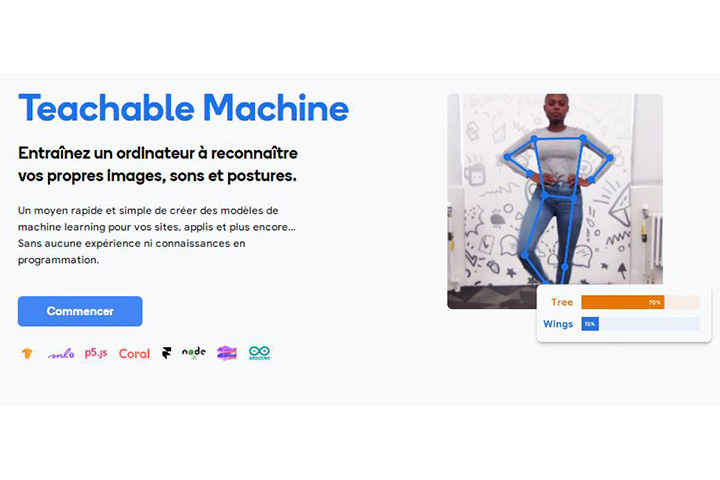Teachable Machine
Teachable Machine by Google: Create simple machine learning models for image, audio, and pose classification without coding experience, directly in your browser.
Machine learning has become an essential technology that powers numerous applications across various industries. However, the process of creating machine learning models can be complex and intimidating, especially for those without coding experience. Google’s Teachable Machine offers a solution to this problem by providing a web-based platform that enables users to create simple machine learning models without any coding knowledge. Designed for accessibility and learning, Teachable Machine aims to help people understand the basic concepts behind machine learning and experiment with different types of models. In this article, we will explore the features and capabilities of Teachable Machine and discuss its potential applications and use cases.
Types of Models Supported
Teachable Machine supports three types of machine learning models:
Image Classification: Users can create models that recognize and classify images based on their content. This type of model can be trained to identify objects, animals, or even emotions in images.
Audio Classification: These models can be trained to recognize and classify different types of sounds or spoken words. For example, an audio classification model can be taught to distinguish between musical instruments or identify specific keywords in speech.
Pose Estimation: Pose estimation models are designed to recognize and track human body poses in real-time. These models can be used to create interactive experiences based on body movement or to analyze physical activities.
To train these models, users provide input data and corresponding labels. For example, when training an image classification model, users would upload images and assign them to specific categories or labels.
Training Process in the Browser
Teachable Machine simplifies the process of training machine learning models by allowing users to collect data and train their models directly in the browser. The platform’s user-friendly interface guides users through the process of data collection, model training, and performance testing. This approach enables even those without prior machine learning experience to create their own models and learn about the underlying technology.
During the training process, Teachable Machine allows users to see their model’s performance in real-time. Users can adjust parameters and experiment with different settings to optimize their model’s performance, providing valuable insights into the relationship between data quality, model complexity, and overall accuracy.
Exporting Models for Use
Once a model is trained, Teachable Machine enables users to export their models for use in web applications or other projects. The platform supports various export formats, making it easy to share and implement machine learning models across different platforms.
Some of the export formats supported by Teachable Machine include TensorFlow.js, which enables users to run their models in web browsers, and TensorFlow Lite, which allows for the deployment of models on mobile and edge devices. By offering these export options, Teachable Machine facilitates the integration of machine learning models into a wide range of applications and environments.
Educational Potential of Teachable Machine
Teachable Machine serves as a powerful educational tool for learning about machine learning and artificial intelligence. By providing a hands-on approach to model creation, the platform helps users learn the basic concepts behind machine learning, such as data quality, labeling, and model training.
Experimenting with different types of models and adjusting their parameters allows users to gain a deeper understanding of the factors that contribute to a model’s performance. Through this process, users can learn about the importance of data quality, the impact of different model architectures, and the role of parameter tuning in optimizing model performance.
Applications and Use Cases
Teachable Machine’s accessible approach to machine learning opens up a wide range of applications and use cases. Some potential applications include:
Creative Projects and Interactive Experiences: Users can create interactive art installations, games, or other experiences that respond to user input through image, audio, or pose recognition.
Prototype Machine Learning Solutions: Teachable Machine can be used to rapidly prototype machine learning solutions for various tasks,Educational Tool for Teaching and Learning about AI and Machine Learning: Educators can incorporate Teachable Machine into their curriculum to help students gain hands-on experience with machine learning concepts, making abstract ideas more tangible and accessible.
Accessibility Solutions: Teachable Machine can be employed to develop applications that improve accessibility for people with disabilities, such as tools that recognize sign language or convert spoken language to text.
Market Research and Analysis: Companies can utilize Teachable Machine to analyze customer feedback, social media posts, or other data sources to identify trends, patterns, and areas for improvement.
Environmental Monitoring: Machine learning models created with Teachable Machine can be applied to monitor and analyze environmental factors, such as air quality, wildlife populations, or deforestation patterns.
Limitations and Considerations
Despite its many benefits, Teachable Machine has some limitations and considerations that users should be aware of:
Simplicity vs. Complexity: While Teachable Machine is designed for simplicity, it may not offer the same level of flexibility and customization as more advanced machine learning platforms. Users with specific requirements or those seeking more complex models may need to explore other tools.
Data Privacy: Since Teachable Machine processes data in the browser, users should ensure that they have permission to use the data they provide for training and that the data is appropriately anonymized or secured.
Quality of Training Data: The performance of machine learning models is heavily dependent on the quality of the training data. Users should ensure that their data is accurate, representative, and unbiased to achieve the best results.
Conclusion
Teachable Machine is a valuable tool for individuals and organizations looking to explore machine learning and its applications. With its accessible, no-coding-required approach, Teachable Machine helps demystify machine learning, empowering users to experiment with different types of models and gain a better understanding of the technology. From creative projects and interactive experiences to educational tools and prototype solutions, Teachable Machine’s potential applications are vast and varied.
While there are some limitations and considerations to keep in mind, Teachable Machine remains an excellent starting point for those seeking to learn about machine learning or develop simple models for various tasks. By making machine learning more accessible and approachable, Teachable Machine is helping to bridge the gap between complex technology and everyday users, fostering innovation and new possibilities.








